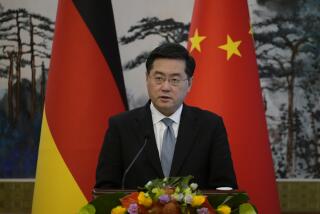China Signals It May Not Veto U.N. Curbs on N. Korea : Asia: Beijing wants to play ‘positive role’ in nuclear dispute, Japanese foreign minister told.
- Share via
BEIJING — Signaling that it might not veto proposed U.N. sanctions against North Korea, China said Sunday that it intends to play a “positive role” in the U.N. debate over Pyongyang’s alleged nuclear weapons program, a Japanese spokesman said.
During a meeting here Sunday, Chinese Foreign Minister Qian Qichen told his Japanese counterpart, Koji Kakizawa, that “China is very much concerned about the present situation,” a Japanese Foreign Ministry spokesman said.
“China will participate positively in the discussions in the U.N. and is ready to play its own positive role,” Qian reportedly added.
He did not comment specifically on how China would respond to a sanctions vote.
But Japanese reporters interpreted Qian’s statements as a hardening of China’s attitude toward North Korea, a longtime Communist ally whose relationship with Beijing was once so close that the late Chinese leader Mao Tse-tung compared it to “lips and teeth.”
One of the five U.N. Security Council members with veto power, China opposes proposals sponsored by the United States to apply sanctions against North Korea, claiming that they would be “ineffective.”
The Clinton Administration is hoping that China will not exercise its veto to block the proposed sanctions, which could come to a vote this week.
Administration officials have indicated that they will seek gradual, phased-in sanctions against North Korea, which has continued to defy international demands for inspection of its nuclear facilities.
The plan for incremental sanctions, expected to be unveiled this week, might begin with stopping scientific and cultural exchanges and halting U.N. technical assistance. Stiffer economic sanctions might follow if the milder measures proved ineffective.
On Sunday, Assistant Secretary of State Robert L. Gallucci insisted that the rough plan is not a sign of White House backpedaling on foreign policy.
“The policy is the same as it has been over the last year,” Gallucci said Sunday on ABC-TV’s “This Week With David Brinkley.” “Over the last year, the Administration has been committed to the objective of getting North Korea to forsake its nuclear weapons program . . . and to make sure that program doesn’t end up destabilizing a whole global non-proliferation regime.”
The aim of the phased strategy, he said, is to “get the North Koreans to agree that it’s in their interest to avoid other outcomes which they may find uncomfortable or more painful.”
Gallucci stressed that the Administration has not backed down from its belief that it is unacceptable for North Korea to develop a nuclear weapons program. And he said the Administration has not ruled out the possibility of military action if the North Koreans do not respond to economic sanctions.
He also said President Clinton has not given final approval for the proposed sanctions policy and that a final draft would have to be discussed with the United Nations and key allies, including Japan and South Korea.
A leading Republican senator criticized the proposed strategy, arguing that it is a form of appeasement.
“I agree (that there would be) terrible consequences (from) a conflict on the Korean peninsula,” Sen. John McCain (R-Ariz.) said on the ABC program. “(But) I would suggest that we should also think about the consequences of a delay and doing nothing until the point where North Korea is a nuclear power. . . .
“I would suggest the attempt to impose sanctions, and strict sanctions, first,” McCain added. “If that’s not effective . . . then, yes, military air strikes would be called for.”
The meeting between Qian and Kakizawa on Sunday followed a series of consultations in China about the North Korea dilemma.
Last week, South Korean Foreign Minister Han Sung Joo visited China to try to dissuade Beijing from vetoing any sanctions resolution.
According to the Japanese Foreign Ministry spokesman, Chinese officials have kept in close contact with the North Koreans on several official and unofficial fronts as the debate over Pyongyang’s alleged nuclear weapons program has mounted.
The United States says North Korea may already have one or two nuclear devices. North Korea has insisted that it has no nuclear weapons program and has repeatedly said it would view sanctions as an act of war.
Times staff writers Sam Jameson in Tokyo and James Risen in Washington contributed to this report.
More to Read
Sign up for Essential California
The most important California stories and recommendations in your inbox every morning.
You may occasionally receive promotional content from the Los Angeles Times.













